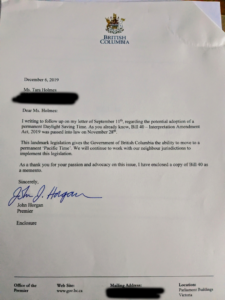British Columbians will turn their clocks back to Pacific Standard Time this weekend on Sunday, Nov. 3, at 2 a.m.
However, it could be one of the last times that BCers will need to make the controversial adjustment from Daylight Savings Time (DST) to Pacific Standard Time on their clocks. Bill 40 was introduced into legislature back in 2020 and would stop the need to “fall” back an hour due to a petition from the group Stop the Time Change, that garnered over 25,000 signatures between 2015 and 2020.
In 2019, the provincial government launched its own online survey asking if British Columbians wanted the clocks to stop changing, or continue with seasonal change. An overwhelming 93 per cent said they were for scrapping the time change.
Tara Holmes, a founding member of Stop the Time Change, is hopeful and still advocating for the bill to be implemented.
“We’re hoping if we can get a lot of correspondence going into the Premier’s office, he may just decide to enact that bill because it’s already there.”
Back in 2020, then-premier John Horgan approved a bill that put the change into the legislature. Though the legislation has been in place for several years, it has yet to be implemented as the province waits for neighboring U.S. states, particularly Washington, Oregon, and California, to make a similar switch. British Columbia’s goal is to synchronize the time with these states to avoid disruptions in cross-border business and travel.

Holmes believes that the province’s reasoning is an “easy excuse”, and that there is no need to wait for the bill to be implemented.
“Our hope is that our Premier will listen to British Columbian’s voice and not wait,” says Holmes in reference to both the petition and online survey. “It’s not like we need to be at the exact same time as Seattle to do business. We do business with Alberta, and they’re an hour different from us, and we have no problem doing trade and business with Alberta.”
Horgan also visited the Yukon in 2019 and met with then-premier Sandy Silver to see if the Yukon Territory would follow B.C if there was a switch. Yukon made the daylight savings change in 2020. Saskatchewan, primarily a farming province, has not switched their clocks since 1966, that helps debunk one of the common myths that DST was introduced for farming.
“The First World War was when DST was introduced,” Holmes explains. “It was never about farming. They needed it to conserve energy while burning coal and oils for their lamps. We also don’t change our clocks back every six months. We actually do it eight months and four months. So our bodies are used to being on DST for eight months of the year.”
With her background in media, Holmes has done her own interviews and research with experts who say that keeping to DST would be better for the economy and our general health all around.
“The experts even say, the highest educated people, say it’s better for the economy. People don’t rush home to get inside when it starts getting dark. Talk to the nurses who will have to pull an extra hour on their overnight shift in the hospital. It’s dangerous.”
“It was the number one correspondent issue and survey in the premier’s office [in 2019]. More responded to this than they did when they were legalizing cannabis.” Holmes continues. “It is a big deal to a lot of people. New parents, people with pets, seniors have such a hard time with it, residences, and immigrants… people with sleep disorders. The Province and we have done our due diligence. The hard work is done, the bill is already done. Once it’s implemented, we will adjust, and then nobody will be talking about this anymore, and the province can focus on the other major issues it needs to fix.”
Sunday November 3 at 2 a.m is when the clocks “fall” back an hour. Holmes urges people to be careful with the clocks going back an hour this weekend, as it will be darker and more dangerous for motorists, students, workers, and seniors travelling on roads.
Something going on in the Cariboo you think people should know about?
Send us a news tip by emailing [email protected].










